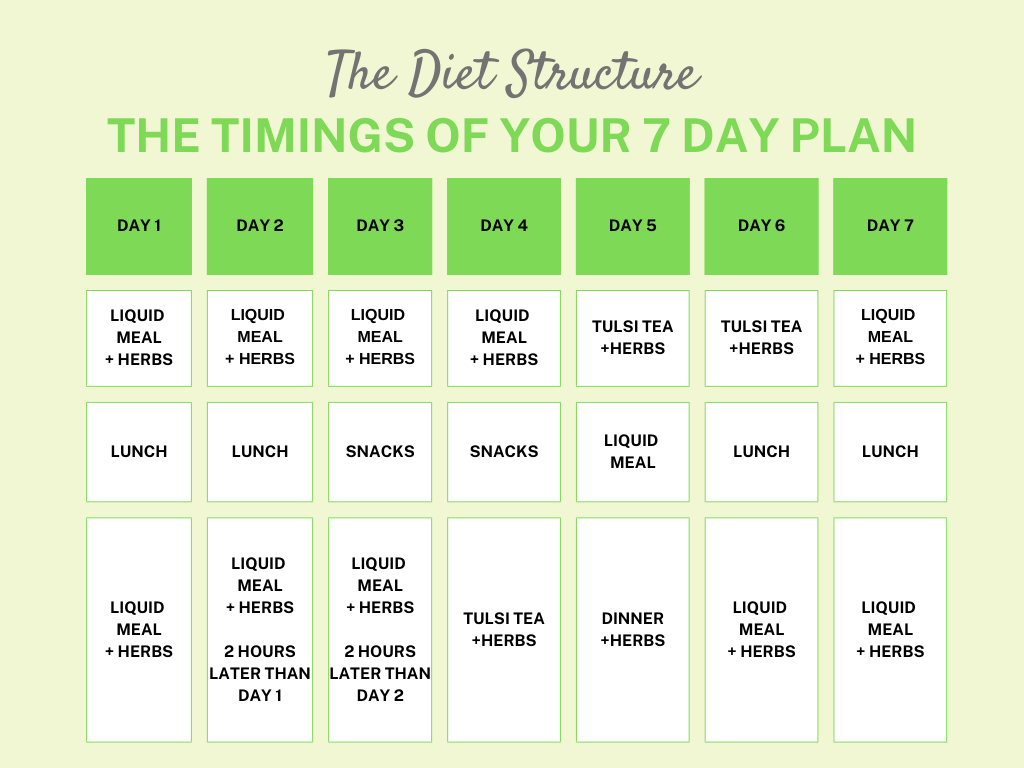
The Vata Plan
A liquid meal can be either a shake/smoothie or a soup.
A snack can either be singular ingredients or a smaller version of a meal.
You can drink Tulsi throughout this 10 day program. As much as you want as its great for detoxification and stomach digestion.
The target of this diet is to get a 24 hour fast done to allow the body to reset. The gut will be able to re-function and on a cellular level you can cleanse the body. There will be a 24 hour period of no food on the day 4 to day 5.
If you are unable to have the evening meal 2 hours earlier each day, extend the period 2 hours forward in on the meal 1 the next day.
It's this priming of intermittent fasting that allows us to cope better with the 24 hour fast. Building up to 18-20 hour fast in the first few days as the night time sleeping will help us use up a lot of time.
If at any point you fall off track it's important for you to not judge yourself or give yourself a hard time. But just repeat that day again. So the timing of intermittent fasting can continue on.
Here is a comprehensive list of foods for the Vata dosha group, curated for your 10-day bloat plan, organized for ease of reference. This will help ensure that Vata individuals can optimize digestion, reduce bloating, and maintain balance during the plan.
Foods to Enjoy (Vata Pacifying)
These foods nourish and ground Vata, focusing on warm, cooked, and mildly spiced options.
Vegetables (Cooked Preferred)
-
Good Choices:
Asparagus, beets, carrots, cooked cabbage*, cauliflower*, cucumber, fennel, garlic, green beans, leeks, lettuce, mustard greens*, okra, black olives, onions*, parsley*, parsnips, peas, sweet potatoes/yams, pumpkins, spaghetti squash*, spinach*, sprouts*, summer squash, zucchini, taro root, turnip greens*, watercress.Notes: Always steam, sauté, or roast for easy digestion. Use spices like turmeric and cumin to further aid digestion.
Fruits
-
Good Choices:
Cooked apples, apricots, avocado, berries (except strawberries), sweet cherries, coconut, fresh dates, fresh figs, kiwis, lemons, lime, mangoes, melons, papaya, peaches, pineapple, plums, soaked prunes*, rhubarb, tamarind.Tip: Opt for sweet, ripe fruits and avoid overly sour or astringent fruits.
Dairy Substitutes
-
Hemp milk, rice milk, almond milk, hazelnut milk, walnut milk, cashew milk, and unsweetened canned coconut milk.
Note: Ensure beverages are warm or room temperature to balance Vata’s cold tendencies.
Grains
-
Brown rice, red rice, black rice, basmati rice, wild rice, amaranth*, teff, and quinoa.
Tip: Cook with warming spices like cinnamon or cardamom for enhanced Vata digestion.
Animal Protein
-
Cold-water fish: Halibut, herring, mackerel, pike, sardines, salmon, trout, tuna.
-
Poultry: Duck, dark meat chicken, dark meat turkey.
Note: Avoid processed or overly dry meats. Cooking with oils and herbs adds grounding energy.
Vegetable Proteins
-
Chickpeas*, mung beans, mung dal, tur dal, urad dal.
Tip: Cook legumes thoroughly and pair with spices like ginger or asafoetida to prevent gas.
Nuts & Seeds
-
Black walnuts*, Brazil nuts*, cashews*, coconut*, filberts*, hazelnuts*, macadamia nuts*, pecans*.
Note: Avoid over-roasting; consume in moderation to prevent heaviness.
Oils
-
Almond oil, avocado oil, coconut oil, sesame oil, walnut oil, pumpkin oil, cold-pressed extra virgin olive oil (for dressings).
Tip: Coconut oil is excellent for soothing digestion and inflammation.
Beverages
-
Filtered/distilled/mineral water (room temp or warm).
-
Herbal teas: Tulsi, yerba mate, green, white, or red teas.
-
Aloe vera juice*, fresh apple cider (unsweetened), fresh-squeezed juice (cherry, orange, citrus, cranberry, grape, etc.).
Tip: Avoid cold or iced drinks as they aggravate Vata.
Sweeteners
- Stevia.
Condiments & Spices
- Vinegar, wheat-free tamari, soy-free miso, coconut liquid aminos, lemons, limes.
- Spices: Cinnamon, cumin, ginger, turmeric, dill, oregano, rosemary, thyme, black pepper*.
- Seaweed: Kelp, dulse, hijiki, komba.
- Others: Unsweetened mustard, baking soda.
Option 1 Menu
Morning: Liquid Meal
Avocado, Blueberry, Raspberry Smoothie
- Hydration + healthy fats from avocado.
- Rich in antioxidants (blueberries and raspberries support gut health).
- Add water or ice for a refreshing, easily digestible meal.
Lunch: Balanced Plate
Steamed Carrots, Peas, Green Beans with Roasted Salmon and Quinoa
- Carrots, peas, and green beans provide vitamins, minerals, and fiber to calm the gut.
- Salmon (rich in omega-3s) fights inflammation.
- Quinoa is a gentle, gluten-free grain to provide energy.
Evening: Liquid Meal
Roast Parsnip Soup with Leeks and Stock
- Parsnips are warming and grounding, perfect for pacifying Vata.
- Leeks and stock add a savory element while aiding digestion.
Option 2 Menu
Morning: Liquid Meal
Kiwi, Mango, Pineapple Smoothie
- A tropical blend packed with digestive enzymes (especially in pineapple) to ease bloating.
- Kiwi and mango add natural sweetness and vitamin C.
Lunch: Balanced Plate
Roasted Sweet Potato Wedges, Cooked Cabbage, and Cauliflower with Tuna Steak
- Sweet potato is grounding and rich in fiber.
- Cabbage and cauliflower provide cruciferous veggie benefits when cooked, preventing digestive discomfort.
- Tuna steak is lean protein to support muscle repair and overall balance.
Evening: Liquid Meal
Roasted Butternut Squash Soup with Leeks and Stock
- Butternut squash is soothing to the gut and loaded with beta-carotene.
- Leeks and stock create a warming and nutrient-rich base.
